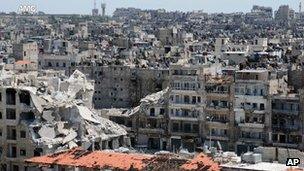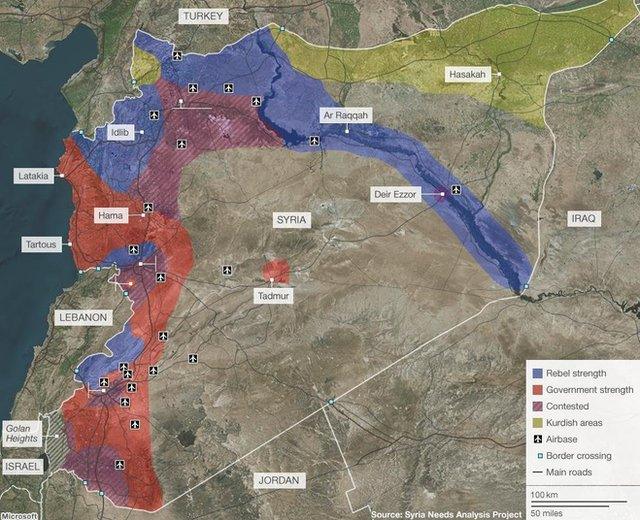France demands release of journalists missing in Syria
- Published

The journalists were said to have been making their way to Aleppo
Two French journalists missing in Syria must be released immediately, France's President Francois Hollande has said.
Speaking in Japan, he said the men "do not represent any state" and were working "so the world can get information" on the conflict in Syria.
The men were named by their employer, French radio station Europe 1, as Didier Francois and Edouard Elias.
They had been travelling to Aleppo and had not been heard from in 24 hours, Europe 1 said.
Meanwhile, Austria has announced it is to withdraw its peacekeepers from the Golan Heights because of fighting between the government and rebel forces there.
The border clashes came a day after Syrian troops backed by Lebanese Hezbollah militants retook the key town of Qusair.
'Unacceptable' threat
"We have indeed lost contact with these two journalists, but we do not yet know the exact circumstances," President Hollande said during a visit to Japan.
"I call for the immediate release of these journalists because they do not represent any state. These are men who have worked so the world can get information. Journalists must be treated as journalists."
Europe 1 said its reporter Didier Francois and photographer Edouard Elias had gone missing as they were heading to the northern Syrian city of Aleppo, adding that the French authorities were "doing everything to provide us with information".
Earlier this week, France accused "the regime and its accomplices" of using sarin, saying it had confirmed numerous uses of the nerve agent during lab tests in Paris.
Austria's decision to withdraw its soldiers from the Golan Heights came after days of fighting around Quneitra - the only open crossing between Syria and the Israeli-controlled Golan Heights.
Austria, whose troops make up more than a third of the more than 900-strong UN monitoring force, said the threat had "reached an unacceptable level".
The UN said the withdrawal of Austrian troops would affect the mission's operational capacity and it would look for replacements.
Croatia, Canada and Japan had already withdrawn their contingents in the Golan because of the conflict in Syria.
Israel expressed regret at Austria's decision, and said it hoped it would not lead to "further escalation" in the region.
Israeli officials have voiced fears the civil war in Syria could spill over their borders. They are worried the Golan Heights could be used to launch attacks against Israel - either by Islamist extremists fighting for the rebels, or by Hezbollah militants fighting on the government side.
Ruined city
Hezbollah's growing role in the conflict was highlighted by its involvement in the battle for Qusair, which government forces recaptured on Wednesday after a bitter siege.
Hezbollah is a political and military organisation in Lebanon made up mainly of Shia Muslims.
It emerged with backing from Iran in the early 1980s when it fought Israeli forces in southern Lebanon and has always been a close ally of Syrian President Bashar al-Assad.
Its involvement in Syria has heightened sectarian tensions across the region, and the US has called for it to withdraw.
Qusair lies only 10km (6 miles) from the Lebanese border and is close to important supply routes for both the government and rebels.
More than 80,000 people have been killed in Syria and more than 1.5 million have fled the country since an uprising against President Assad began in 2011, according to UN estimates.
International efforts to resolve Syria's conflict continue, but the US and Russia have failed to set a date for proposed peace talks.
